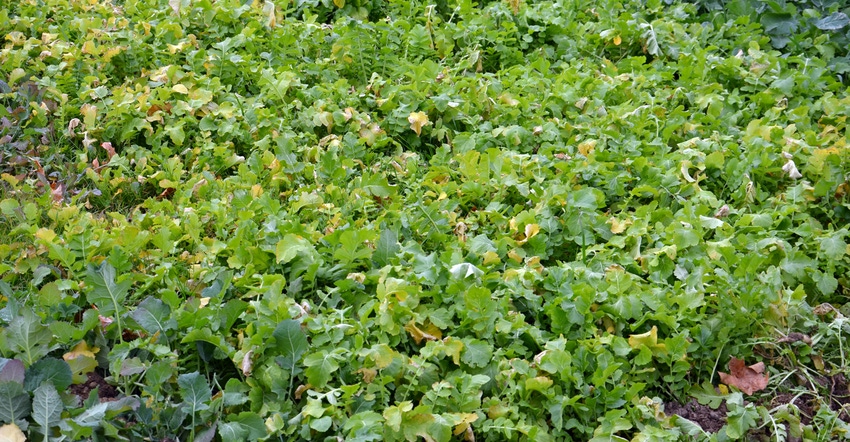
Are you concerned about using fungicides? Don Donovan says some Indiana farmers using brassicas in cover crop mixes find that they may help reduce the need for fungicides in some cases.
Donovan is a district conservationist in west-central Indiana. The information on this possible tie between brassicas and cover crops, as well as two other issues addressed below, was prepared by the Indiana Conservation Partnership. This team is led by Natural Resources Conservation Service personnel, including Donovan, Clint Harrison and Derek Schmitt, district conservationists; Susannah Hinds, grazing specialist; Scot Haley, resource soil scientist; Kris Vance, public affairs specialist; Victor Shelton, state agronomist/grazing specialist; Tony Bailey, state conservation agronomist; and Shannon Zezula, state resource conservationist.
The use of brassicas, such as various mustards or rapeseed, has been shown in some cases to provide a suppression of fungal disease problems. It’s another one of those potential benefits of cover crops that people talk about but that isn’t scientifically proven.
Get more INSIGHT: Download Cover Crops: Best Management Practices now!
To see if brassicas would help on your farm, consider setting up some strip trials in a field that may have some fungal concerns. As with all field-level trials, leave a control strip in addition to any treatment strip you wish to try. You can compare fungicide products, in addition to a fall-seeded brassica cover crop. The width of the strips should be at least twice the width of the combine header you will use to harvest the crop. With the assistance of your local crop adviser, monitor the strips throughout the growing season, noting any differences in disease incidence, crop health and yield. Cover crops can provide many benefits; maybe control of fungal issues can be one of those benefits on your farm.
Will late nitrogen pay?
Indiana farmers are finding that some of the newer “racehorse” corn varieties take up available nitrogen much later than some older varieties, Donovan says. They may need N all the way to black layer if the corn plant is healthy and free of stress.
There may be some yield and economic advantages to late applications of nitrogen, possibly using Y-Drops on a high-clearance machine. Donovan suggests this is another reason to set up strip trials on your farm, using different N rates and application dates, and even participating in a stalk-sampling program such as INfield Advantage to determine if you are getting the maximum nitrogen use efficiency. To learn about INfield Advantage, visit infieldadvantage.org.
Prevented planting and cover crops
Excessive rainfall and prolonged ponding or flooding that occurs in late spring or early summer may result in unplanted fields. Flooding and erosion can remove valuable topsoil, nutrients, organic matter and soil organisms, Donovan says.
To rebuild lost productive capacity and improve soil health, growing a cover crop for the remainder of the season is crucial. In fact, having something green and growing during all times of the year is a key concept for improving soil health, building soil organic matter, protecting the soil, and improving water and nutrient cycling. Plus, flowering cover crops can benefit pollinators.
If you have some areas that didn’t get planted this spring, consider a summer cover crop mix of millet, sorghum-sudangrass, sunn hemp, sunflower, buckwheat and other summer annuals. This can help restore soil biology, improve organic matter, control weeds and prevent soil erosion.
About the Author(s)
You May Also Like




